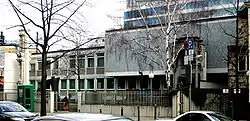Tupamaros West-Berlin
The Tupamaros West-Berlin (TW) were a small German Marxist organization which carried out a series of bombings and arsons at the end of the 1960s.[1] In 1969 Dieter Kunzelmann, Georg von Rauch, and a few others traveled to Jordan to train at a Fatah camp, forming the Tupamaros on their return to Germany.[2][3] The group took their name from the Uruguayan Tupamaros. The TW had a core membership of about 15 people.[3]

Their first action was an attempted bombing of West Berlin's Jewish Community Centre on November 9, 1969 (the anniversary of Kristallnacht); the bomb, supplied by the undercover government agent Peter Urbach, failed to explode.[4][5] This was followed in the fall of 1969 by a number of bombings and arsons targeting police, judges, and US and Israeli targets.[6] The TW claimed responsibility for these attacks under a variety of different names in order to exaggerate the size of their movement.[6]
The group was led by Kunzelmann and von Rauch, and dissolved after the former was arrested in 1970 and the latter was killed by police in 1971.[3] Its core members then formed the Movement 2 June, while some others joined the Red Army Faction.[3][7]
The Jewish Community Centre bombing
In 2005 the historian Wolfgang Kraushaar published a book on the Tupamaros' attempted bombing of the West Berlin Jewish Community Centre, setting off a debate on anti-semitism in the German left and the German student movement.[4][8] The bombing was allegedly planned by Kunzelmann and the bomb itself planted by Albert Fichter, brother of the Sozialistischer Deutscher Studentenbund's then-chairman, Tilman Fichter.[4] On the date of the attempted bombing more than 200 people had gathered in the community center to commemorate Kristallnacht.[4]
The Tupamaros Munich
Around the time of the TW's creation Fritz Teufel formed a similar group in Munich, the Tupamaros Munich (TM).[6] Brigitte Mohnhaupt, later an important figure in the second generation of the RAF, was a member.[9]
References
- Kundnani, Hans (2009). Utopia Or Auschwitz: Germany's 1968 Generation and the Holocaust. Columbia University Press. p. 114.
- Kundnani 91, 99
- Hauser, Dorothea (2008). "Terrorism". In Martin Klimke, Joachim Scharloth (ed.). 1968 in Europe: a history of protest and activism, 1956-1977. Palgrave Macmillan. pp. 271–72.
- Gessler, Philipp; Stefan Reinecke (25 October 2005). "The anti-Semitism of the 68ers". die tageszeitung. Retrieved 22 April 2010. Translated into English by Sign and Sight.
- Kundnani 88, 90
- Kundnani 97
- Huffman, Richard. "Tupamaros". Baader-Meinhof.com. Archived from the original on 27 July 2010. Retrieved 22 April 2010.
- Parkes, K. Stuart (2009). Writers and politics in Germany, 1945-2008. Camden House. p. 84.
- Smith, J.; André Moncourt (2008). Daring To Struggle, Failing To Win: The Red Army Faction’s 1977 Campaign Of Desperation. PM Press. p. 37. ISBN 1-60486-028-6.